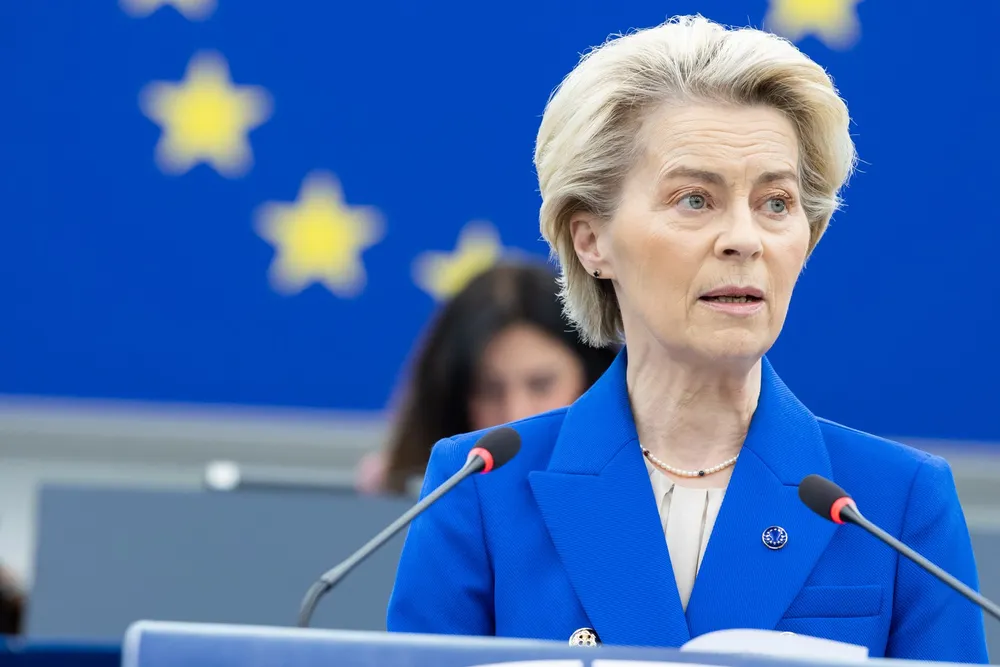'Made in Europe' criterion not enough to boost wind power, EU's von der Leyen told
WindEurope and German engineering federation have mixed reactions to European Commission President’s State of the Union speech

Wind and manufacturing associations had a mixed reaction to European Commission President Ursula von der Leyen’s State of the Union speech, welcoming a ‘made in Europe’ initiative for public procurement but demanding more action to boost the wind power expansion and criticising her justification of the uneven tariff deal with US President Donald Trump.
Von der Leyen, in her speech, went into great length to denounce Russia’s war of aggression against Ukraine. She indirectly used the EU’s weakness in defence matters to justify her recent verbal deal with Trump under which the EU accepts a 15% minimum tariff for its goods in the US, while granting American industrial products free access to its markets.
Pan-European industry group WindEurope highlighted that von der Lyen acknowledged a new geopolitical reality in which economic competition and national security are intertwined, while stressing the need for Europe to massively invest in digital and clean technologies.
‘Dependencies are ruthlessly weaponised’
International “dependencies are ruthlessly weaponised”, she said, demanding that Europe take control of the energies and technologies which fuel its economy in what she called “Europe’s independence moment”.
“The EU Commission is clear: we need more home-grown wind energy,” WindEurope CEO Giles Dickson said.
“It boosts energy security. It means lower energy bills for consumers. It strengthens our industrial competitiveness. Europe’s wind industry and its 400,000 workers are ready to step up to the task.”
While repeating calls to “massively invest in digital and clean tech”, von der Leyen, among other things, also called for incentivising demand for domestically produced clean tech via the introduction of a new “made in Europe” criterion in public procurement procedures as well as an Industrial Accelerator Act for key clean technologies.
While WindEurope welcomed the Commission’s push to speed up the build-out of home-grown wind power, it pointed to the less-than-expected expansion of only 5.3GW in new capacity during the first half of this year.
To achieve 2030 energy security and climate targets, the wind industry demanded national governments remove key obstacles to new wind projects by speeding up permitting, expanding Europe’s power grid and interconnections, removing barriers to direct electrification, and de-risking wind tenders through a stable pipeline of contract for difference auctions.
“It’s time to seriously ramp up wind energy in the EU – we only built 5GW in the first half of this year,” Dickson said.
“Governments have got to pull their finger out - apply the EU permitting rules, build out the grids more quickly, push electrification. And make sure there’s a business case for clean energy.”
‘EU must urgently renegotiate’ tariff deal
Germany’s engineering federation VDMA – which includes a section for wind turbine manufacturers – was much more critical of von der Leyen’s speech.
"We are disappointed that the Commission President continues to describe the tariff deal between the EU and the US as a guarantee of stability in relations with the US,” VDMA general manager Thilo Brodtmann said.
“Mechanical and plant engineering companies, which have been hit hard by the additional punitive tariffs on steel and aluminum, see an urgent need for renegotiation."
For large European industrial sectors such as mechanical engineering, trade with the US has become even more unpredictable - and at times even impossible, following the deal, he said, adding that the EU must urgently renegotiate the tariff deal.
"Ursula von der Leyen rightly emphasises that competitiveness is the basis for independence and industrial strength is the prerequisite for security in Europe,” Brodtmann said.
“However, the EU Commission should not indulge in the illusion that competitiveness can be achieved through protective industrial policies for individual sectors."
(Copyright)